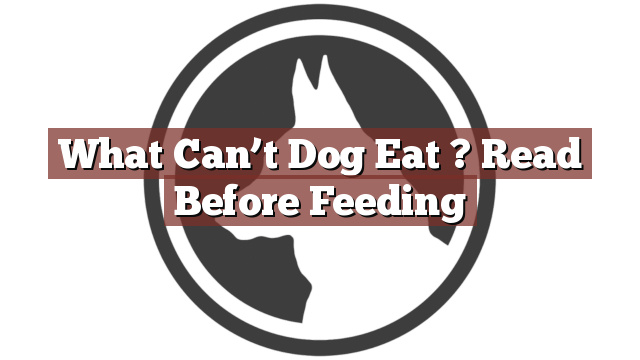Understanding Your Dog’s Dietary Needs
As a responsible dog owner, it is crucial to understand your furry friend’s dietary needs. Dogs are omnivores, which means they can consume a variety of foods. However, not all human foods are safe for dogs to eat. It is important to be knowledgeable about what foods are harmful and potentially toxic to dogs.
What Can’t Dog Eat? Read Before Feeding
Can dogs eat grapes? Absolutely not. Grapes and raisins can be extremely toxic to dogs, potentially causing kidney failure. It is recommended to keep grapes and raisins out of your dog’s reach at all times.
Can dogs eat chocolate? No, chocolate is toxic to dogs. It contains theobromine, which can cause vomiting, diarrhea, increased heart rate, seizures, and in severe cases, even death. Keep all chocolate products far away from your furry friend.
Can dogs eat onions and garlic? No, both onions and garlic contain compounds that can damage a dog’s red blood cells, leading to anemia. These ingredients are commonly found in many dishes, so it is essential to be cautious and avoid feeding your dog any food that contains them.
Can dogs eat avocados? No, avocados contain a substance called persin, which can cause vomiting and diarrhea in dogs. Additionally, the pit poses a choking hazard and can cause intestinal blockages if ingested.
Can dogs eat xylitol? Absolutely not. Xylitol is a sweetener commonly found in sugar-free gum, candies, and some baked goods. Ingesting xylitol can cause a sudden release of insulin in dogs, leading to life-threatening hypoglycemia.
Pros and Cons of Feeding It to a Dog
Feeding your dog a balanced diet is crucial for their overall health and well-being. While it may be tempting to share certain human foods with your furry friend, it is essential to consider the potential risks. The cons of feeding dogs certain foods, such as grapes, chocolate, onions, garlic, avocados, and xylitol, can be severe, including organ failure or even death.
On the other hand, there are several pros to carefully choosing a diet suitable for your dog. A well-balanced diet can provide the necessary nutrients, vitamins, and minerals to support their immune system, maintain healthy skin and coat, and promote proper growth and development. Consult with your veterinarian to understand your dog’s specific dietary requirements and ensure they receive the nutrition they need.
Conclusion: Responsible Feeding for a Healthy Dog
In conclusion, it is crucial to be educated about what foods are safe and what foods are toxic to dogs. While it may be tempting to share certain human foods with your furry companion, it is always best to err on the side of caution and stick to a diet specifically formulated for dogs. The health and well-being of your dog should always be the top priority. If you suspect your dog has ingested any toxic substances, contact your veterinarian immediately for guidance and assistance.
Thank you for taking the time to read through our exploration of [page_title]. As every dog lover knows, our furry friends have unique dietary needs and responses, often varying from one canine to another. This is why it's paramount to approach any changes in their diet with caution and knowledge.
Before introducing any new treats or making alterations to your dog's diet based on our insights, it's crucial to consult with a veterinarian about [page_title]. Their expertise ensures that the choices you make are well-suited to your particular pet's health and well-being.
Even seemingly harmless foods can sometimes lead to allergic reactions or digestive issues, which is why monitoring your dog after introducing any new food item is essential.
The content provided here on [page_title] is crafted with care, thorough research, and a genuine love for dogs. Nevertheless, it serves as a general guideline and should not be considered a substitute for professional veterinary advice.
Always prioritize the expert insights of your veterinarian, and remember that the health and happiness of your furry companion come first.
May your journey with your pet continue to be filled with joy, love, and safe culinary adventures. Happy reading, and even happier snacking for your canine friend!

